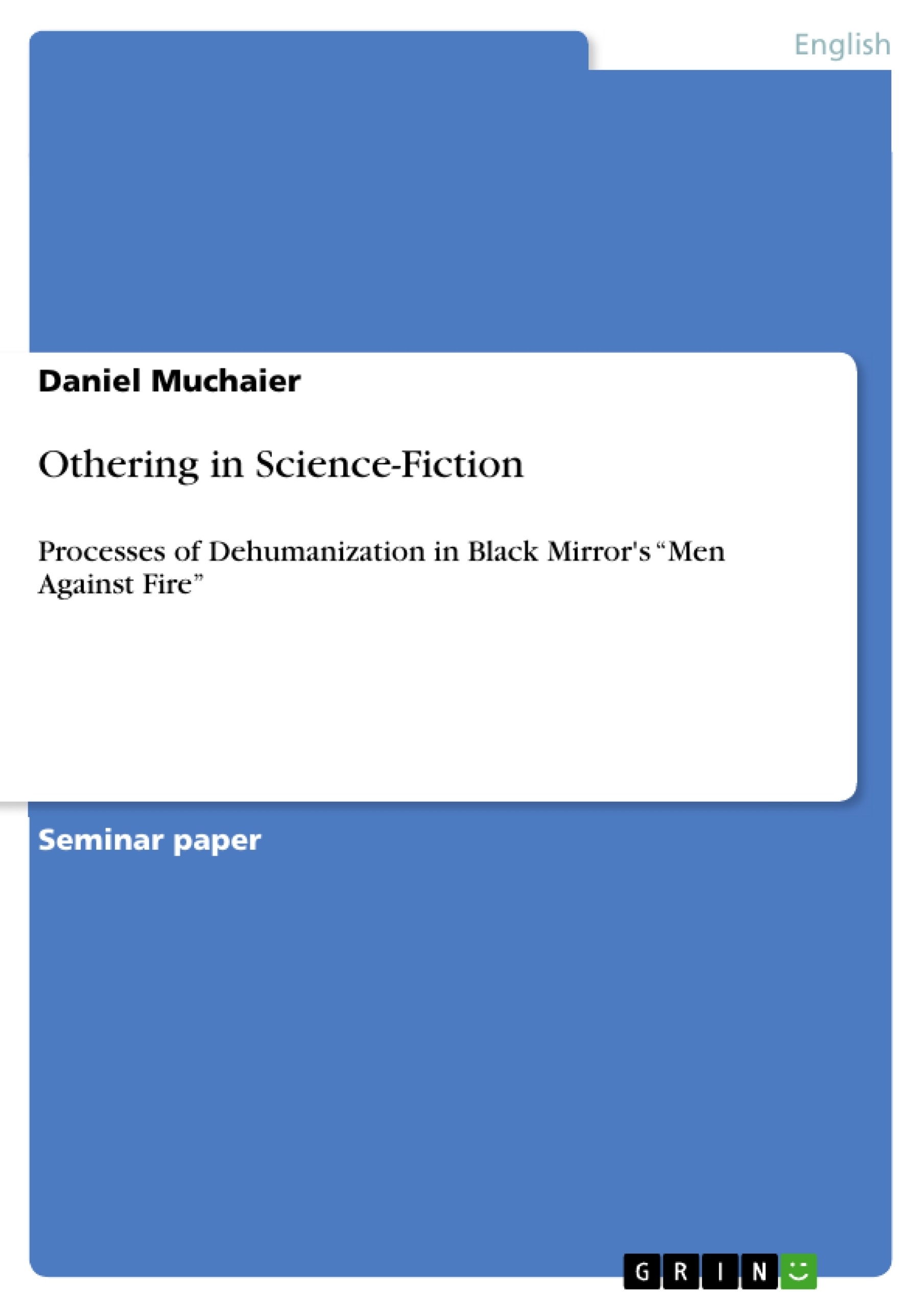This paper analyzes the implementation of the postcolonial concepts of othering and dehumanization in the Black Mirror episode “Men Against Fire” (2016). The concepts are outlined in the first chapters and later applied to the text and subtext of the episode. The author focuses on individual identity and group identity formation processes, in-group favoritism and out-group homogeneity, othering and dehumanization as inter-group discrimination and the role of language and names in regard to human identity.
Inhaltsverzeichnis (Table of Contents)
- Introduction
- The Importance of Group Identity
- In-Group Favoritism and Out-Group Homogeneity
- Othering
- Dehumanization
- Men Against Fire
- Dehumanization and Othering in Men Against Fire
- Projection of Negative Images
- Institutionalized Othering
- Moral Disengagement through Dehumanization
- Language as a Marker of Humanness
- Names as a Marker of Human Identity
- Conclusion
Zielsetzung und Themenschwerpunkte (Objectives and Key Themes)
This paper explores the theme of dehumanization in the context of group dynamics and its portrayal in the science fiction television series Black Mirror. The episode "Men Against Fire" is analyzed to understand how the series utilizes postcolonial concepts of othering and dehumanization to depict a dystopian future where technological advances blur the lines between human and inhuman.
- The importance of group identity in shaping individual perceptions and behavior.
- The processes of in-group favoritism and out-group homogeneity as mechanisms of social categorization.
- The concept of "othering" as a means of establishing dominance and marginalization within a society.
- Dehumanization as a tool for moral disengagement and the justification of violence.
- The role of language and names in constructing and dismantling human identity.
Zusammenfassung der Kapitel (Chapter Summaries)
- Introduction: This chapter introduces the theme of dehumanization and explores its relevance to the science fiction genre, particularly in the context of Black Mirror's "Men Against Fire". The chapter highlights the genre's ability to explore contemporary social issues through a futuristic lens.
- The Importance of Group Identity: This chapter delves into the psychology of group formation, examining how individuals identify themselves within social contexts. It discusses the concepts of in-group favoritism and out-group homogeneity and their role in shaping social interactions.
- Othering: This chapter explores the concept of othering, derived from colonial theory, and how it is used to create and maintain social inequalities. The chapter examines the psychological mechanisms behind othering and its implications for power dynamics.
- Men Against Fire: This chapter introduces the episode "Men Against Fire" from Black Mirror and provides an overview of its plot and setting.
- Dehumanization and Othering in Men Against Fire: This chapter analyzes the episode's portrayal of dehumanization and othering, focusing on how the creators utilize these concepts to create a dystopian society. The chapter examines the episode's use of language, visual imagery, and technology to manipulate perceptions of humanness.
Schlüsselwörter (Keywords)
This paper focuses on the concepts of dehumanization, othering, group identity, in-group favoritism, out-group homogeneity, science fiction, Black Mirror, "Men Against Fire", dystopia, technology, social control, and the manipulation of human perception. The analysis explores the intersection of these concepts in the context of a fictional dystopian future.
Frequently Asked Questions
How does the Black Mirror episode 'Men Against Fire' depict dehumanization?
The episode uses technology and language to manipulate soldiers' perceptions, making them see enemies as non-human "roaches" to facilitate moral disengagement.
What is the concept of 'Othering' in this context?
Othering is a postcolonial concept where a dominant group marginalizes another by projecting negative images and highlighting differences to maintain power.
What role does language play in human identity according to the paper?
Language and names serve as markers of humanness; stripping individuals of their names or using derogatory labels is a key step in the dehumanization process.
What are 'In-Group Favoritism' and 'Out-Group Homogeneity'?
These are psychological mechanisms where individuals favor their own group and perceive members of other groups as identical or lacking individuality.
How does Science Fiction address contemporary social issues?
Science Fiction utilizes futuristic settings and dystopian tropes to explore real-world issues like discrimination, social control, and the ethics of technology.
- Citar trabajo
- Daniel Muchaier (Autor), 2020, Othering in Science-Fiction, Múnich, GRIN Verlag, https://www.grin.com/document/937636



